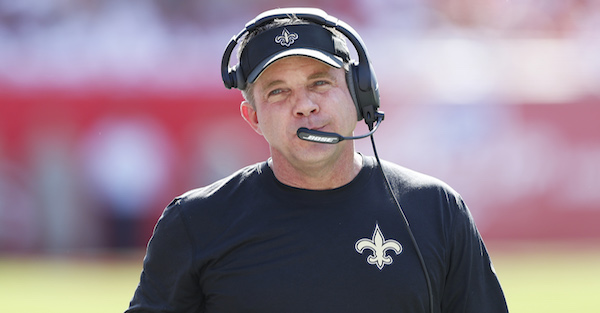It hasn't necessarily been a black eye on the organization in the long-run, but there's no doubting the fact that the "bounty program" run within the New Orleans Saints' defense — headed up by then-defensive coordinator Gregg Williams — wasn't a highlight.
Videos by FanBuzz
It led to head coach Sean Payton serving a one-season suspension — without pay — and Williams being indefinitely suspended by the league. He ended up returning to coaching soon thereafter the suspension, but without a doubt, his reputation took a hit. Some might say Payton's did as well.
The bounty scandal was high profile for both the Saints and the NFL, but apparently, they weren't the only organization around that time paying players extra if they could hurt a star player on the other team.
Brett Favre famously got beat up by the Saints defense in the NFC Championship, but apparently, according to excerpts from his new book, the Minnesota Vikings also had a similar system.
Deadspin was able to publish excerpts from Favre's new book. Excerpts that don't look great for the Vikings, or the NFL for that matter:
This was hardly a shocking move in the Vikings' locker room, where piles of money were regularly collected—then distributed as rewards—for injuring opposing stars. "It was part of the culture," said Artis Hicks, a Minnesota offensive lineman. "I had coaches start a pot and all the veterans put in an extra $100, $200, and if you hurt someone special, you get the money. There was a bottom line, and I think we all bought in: you're there to win, and if taking out the other team's best player helps you win, hey, it's nothing personal. Just business."
The Vikings were trying to go after then-Green Bay linebacker Nick Barnett. That's something that didn't change even once Favre — a famous Packer — joined the Vikings, per the book:
Although the Barnett affair occurred in 2008, Hicks insists the Vikings were no different a year later, when Brett Favre was quarterback. He recalled no one on the team complaining, nobody arguing with the approach. "This isn't a game or culture for the fainthearted," Hicks said. "You bleed, you suffer, you sacrifice, and if need be, you try and knock people out. It's the NFL."
On one hand, Hicks is right. Football, in general, is a tough game, and anyone who plays it knows the inherent risks associated with it.
With that said, an already dangerous game becomes borderline illegal when players start purposely trying to injure the guys on the other side. Forget sportsmanship for a minute, that's a few steps away from warfare, and the fact that they were paid extra for those big hits and big plays that could have taken out their peers and colleagues is despicable.
From football players to contract killers. The line, at least for the Vikings, seemed to have been blurred more than once.
